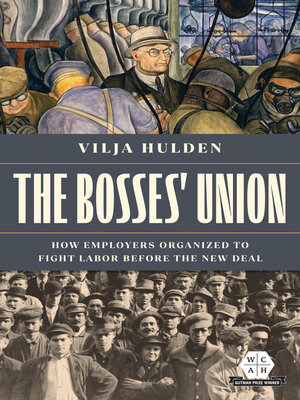The Bosses' Union
ebook ∣ How Employers Organized to Fight Labor before the New Deal · Working Class in American History
By Vilja Hulden

Sign up to save your library
With an OverDrive account, you can save your favorite libraries for at-a-glance information about availability. Find out more about OverDrive accounts.
Find this title in Libby, the library reading app by OverDrive.



Search for a digital library with this title
Title found at these libraries:
| Library Name | Distance |
|---|---|
| Loading... |
Vilja Hulden reveals how this tension provided the opening for pro-business organizations to shift public attention from concerns about inequality and dangerous working conditions to a belief that unions trampled on an individual's right to work. Inventing the term closed shop, employers mounted what they called an open-shop campaign to undermine union demands that workers at unionized workplaces join the union. Employer organizations lobbied Congress to resist labor's proposals as tyrannical, brought court cases to taint labor's tactics as illegal, and influenced newspaper coverage of unions. While employers were not a monolith nor all-powerful, they generally agreed that unions were a nuisance. Employers successfully leveraged money and connections to create perceptions of organized labor that still echo in our discussions of worker rights.
|AcknowledgmentsIntroduction
Chapter 1. The Invention of the Closed Shop: The NAM Weighs In on the Labor Question
Chapter 2. The Deep History of the Closed or Union Shop
Chapter 3. The Potential and Limitations of the Trade Agreement
Chapter 4. The Range and Roots of Employer Positions on Labor
Chapter 5. Employers, Unite? The Bases and Challenges of Employer Collective Action
Chapter 6. The Battle over the State
Chapter 7. The Battle over Public Opinion
Chapter 8. Defending the Status Quo Ante Bellum
Chapter 9. The Gift That Keeps on Giving: Institutionalizing the Open-Shop Ideal in the 1920s
Coda: The Working Class and the Prerequisites of Power
Abbreviations
A Note on Sources and Methods
Notes
Index
|"Hulden's book is chock-full of revealing details recounting the ways that business leaders organized, lobbied politicians, secured legal assistance during union confrontations, and employed labor spies. . . . Read this terrific book to learn more about the many roots and characteristics of that ugly, undemocratic agenda." —Jacobin"The volume's wide range and mastery of the business and labor history of those years makes it a highly recommended study for specialists in those fields and more. Highly recommended." —Choice
"With keen analysis and vivid prose, Vilja Hulden brilliantly illuminates how U.S. employers fought furiously to undermine unions and blunt demands for workplace democracy in the early twentieth century, creating a warped legacy that still haunts our labor relations and diminishes our politics. This powerfully argued book is essential reading for anyone who wishes to understand the long historical roots of today's reawakened fights for worker justice."—Joseph A. McCartin, author of Collision Course: Ronald Reagan, the Air Traffic Controllers, and the Strike that Changed America
|Vilja Hulden is a teaching assistant professor at the University of Colorado Boulder.







